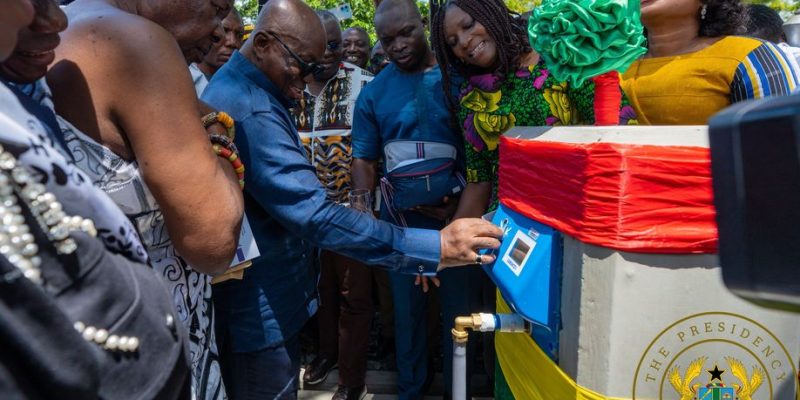In Ghana, new facilities are supplying 95 communities in the Adaklu district with drinking water. They were commissioned on 3 July 2023, in the presence of the President of the Republic of Ghana, Nana Addo Dankwa Akufo-Addo.
Phase III of the Adaklu drinking water supply project is coming to an end after three years of work. The facilities built as part of the project were recently commissioned in this district in Ghana’s Volta region, in the presence of Ghana’s Head of State, Nana Addo Dankwa Akufo-Addo. These include three concrete water reservoirs at Adaklu Kpeleho, Adaklu Sofa and Adaklu Kpatove, a booster station at Adaklu Kpeleho, and 175 kilometres of water pipes to bring drinking water to the communities of Adaklu and Agotime-Ziope.
In his speech at the commissioning ceremony for the new water facilities, Ghana’s Head of State Nana Addo Dankwa Akufo-Addo said that they would boost the supply of drinking water to some 89,150 people in 95 communities in the Adaklu district, as well as in the Central Tongu and Agotime-Ziope districts. “The government’s objective is to ensure that all regions of the country benefit from adequate, safe, affordable and reliable water supply services”, added the Ghanaian president.
The launch of phase IV
The third phase of the Adaklu drinking water supply project, which is now drawing to a close, cost €11.5 million. The Ghanaian government financed the work thanks to a concessionary facility provided by Raiffeisen Bank International (RBI), one of the leading banks in Austria, Central Europe and Eastern Europe.
Read Also – GHANA: strengthening water, sanitation and hygiene policies
The fourth phase of this drinking water project was also announced, currently at the design stage, according to the Ghanaian authorities. “We will also focus on governance and institutional strengthening to accelerate access to equitable water, sanitation and hygiene (WASH) services throughout Ghana”, said President Nana Addo Dankwa Akufo-Addo.
The Adaklu drinking water supply project is part of the “Water for All” programme. The initiative focuses on sustainable policies and actions that take account of ecological systems in order to reduce pollution, promote water-use efficiency, strengthen decentralised management organisations, improve the information and knowledge base and step up education, awareness-raising and monitoring.
Inès Magoum






